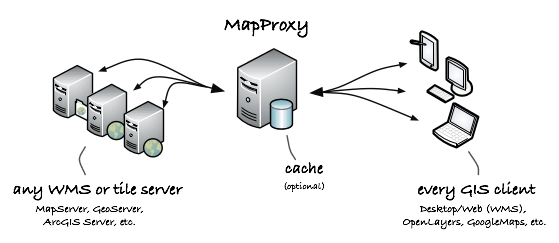

MapProxy Quickstart¶
MapProxy is the swiss army knife for all WMS and tile services. It caches, accelerates and transforms data from existing map services and serves any desktop or web GIS client.

MapProxy is not only a tile cache solution, but also offers many new and innovative features like full support for WMS clients.
Sisältö
Start the service and view the demo¶
MapProxy has flexible deployment options and you can integrate it in Apache for example. But you can also start MapProxy as a standalone service, which is the best option to get started.
To start MapProxy as a standalone service click on .
Open Firefox and navigate to http://localhost:8011/demo
The MapProxy demo page contains a rudimentary WMS and tile client for each configured layer. You can’t select the projection for WMS layers for example, but it is enough to quickly verify that your installation works.
View in desktop GIS¶
You can add MapProxy in any WMS Desktop GIS like QGIS or gvSIG. The service URL is: http://localhost:8011/service?
The MapProxy example configuration contains a few layers that use different map engines and map data. See below for more details about each layer.
Available layers¶
- mapnik:
The world population rendered by Mapnik. You don’t need to start the Mapnik service, because this layer makes use of the integrated Mapnik support in MapProxy.
- mapnik_tile:
The world population rendered by Mapnik as tile layer.
- geoserver:
The US population rendered by the GeoServer WMS. This layer also supports
GetFeatureInforequests which are cascaded to the source WMS. You need to start GeoServer with before accessing this layer.- mapnik_geoserver:
This layer demonstrates the ability to combine multiple sources into one layer. It combines the world population from Mapnik with the US population from GeoServer. The
GetFeatureInfosupport for the US population is still available. You need to start GeoServer with before accessing this layer.- mapserver:
This layer uses Mapserver Itasca demo dataset. It is a local dataset and it uses the coverage feature to limit the BBOX to Itasca, IL.
Create you own configuration¶
You can use mapproxy-util to create new configuration templates and to start a test server.
To create a new configuration:
mapproxy-util create -t base-config ~/mapproxy
To start the test server on port 8011 with the created configuration:
mapproxy-util serve-develop ~/mapproxy/mapproxy.yaml -b 0.0.0.0:8011
You can now visit the demo page at http://127.0.0.1:8011/demo/. MapProxy will automatically reload if you change your configuration file.
Mitä seuraavaksi?¶
Read the documentation of MapProxy
Read the example configuration (
/usr/local/share/mapproxy/mapproxy.yaml)
